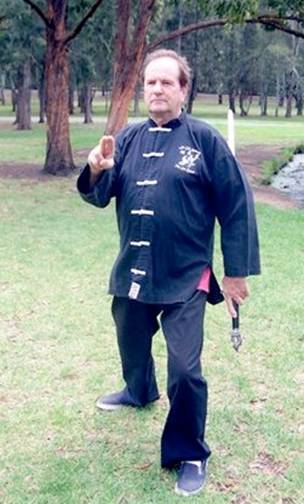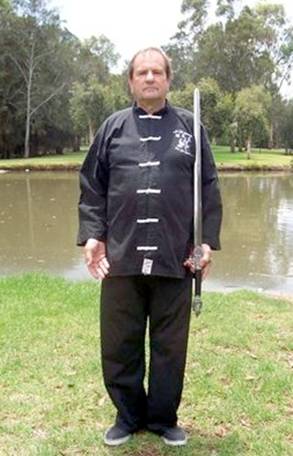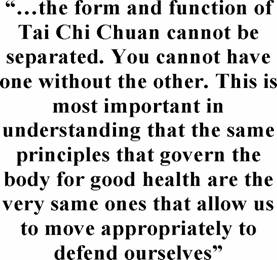timeless principles of Tai Chi Chuan
Interview with Roman Czerniawsky Principal of the Li Chi Hsiang school of Tai Chi Chuan for health and self-defence, Sydney, Australia.
Over the past 20 years Roman Czerniawsky Sifu has been studying and teaching all aspects of Tai Chi Chuan in Sydney Australia. He has taught numerous students many of who are now teaching and passing on the art to their own students
Czerniawsky Sifu believes in maintaining practice in accordance with and adherence to the timeless principles as expressed in the Tai Chi Classic writings. Czerniawsky Sifu teaches both the civil and martial aspects of Tai Chi Chuan.

Question: Czerniawsky Sifu, why did you take up the practice of Tai chi Chuan?
RC: Originally, as I grew too old to cope with the external martial arts, I was looking for something I could do (in a similar vein) that would sustain me and keep me healthy. Little did I realise what an in-depth art I was entering into
Q: Czerniawsky Sifu, you have taught Tai Chi Chuan in Australia for many years, no doubt you have seen many changes in the Tai Chi landscape throughout your time teaching and promoting Tai chi Chuan in Australia, do you feel Tai Chi has become an integral part of Australian society? And what differences "if any" do you see in the way Tai chi is practiced today in Australia?
RC: Not fully yet! I feel that the main differences are all about the depth of the art that is practiced by the different schools.
Q: Czerniawsky Sifu can you share a little of your teaching method and what would one expect attending your classes?
RC: We at Li Chi Hsiang adhere to the Principles and The Classics of the Art. In our class we firstly deal with correct body alignment and structure, then we have exercises that deal with important fundamentals, going on to Form instruction, sensing hands, the Sword Form and Chi development.
Q: Czerniawsky Sifu, how has daily practice of Tai Chi Chuan benefited you?
RC: Tai Chi Chuan has kept me agile in body and in mind. But the greatest benefits have come from learning to let go of stress and maintain a positive attitude.

Q: Czerniawsky Sifu, you have always expressed the importance of teaching Tai Chi Chuan balancing both the civil and martial aspects, why do you feel this is necessary or indeed important?
RC: I believe the Civil and the Martial are the "two sides of the one coin" – meaning that the form and function of Tai Chi Chuan cannot be separated. You cannot have one without the other. This is most important in understanding that the same principles that govern the body for good health are the very same ones that allow us to move appropriately to defend ourselves.
Q: Czerniawsky Sifu, you practice and teach the "Simplified Yang Form" also referred to as "Yang Short Form" or "Cheng Man-Ching’s 37posture Form". Can you tell us a little about this form and why you base your study of Tai chi on this form?
RC: To me the Cheng Man-Ching 37 posture form contains all the elements needed to practice according to the Principles of Tai Chi Chuan.
Q: Czerniawsky Sifu, please tell us of how some of your students have benefited their health through correct and consistent practice of Tai Chi Chuan.
My students all talk about improved posture, balance and relaxation, but there are also cases of improved bone density and in one case a student who has defeated lung cancer attributes his remarkable recovery to a boosted immune system through the consistent application of moving meditation of Tai Chi Chuan.RC:
Q: Czerniawsky Sifu, outside of formal classes, how much and how often should a student practice Tai Chi Chuan?
RC: I believe a student should practice the Form at least once in the morning and once at night, with at least some of the appropriate exercises interspersed during the day.

Q: Czerniawsky Sifu, what role does sensing hands have in learning Tai Chi Chuan?
RC: It is the key for learning the skills of listening, interpreting energy, yielding, neutralising, adhering and issuing energy (Fa Jing). These energies are important in becoming "soft" (ie Sung) and sensitive so that we can experience the principles that guide our Tai Chi Chuan practice.
Q: Czerniawsky Sifu, how long does it take to start getting benefits from practicing Tai Chi Chuan?
RC: Some benefits can be gained in the very first lesson! The rest is up to the students in how they apply themselves.
Q: Czerniawsky Sifu, from your perspective what is Chi energy and how can it be developed through the practice of Tai Chi Chuan?
RC: Chi must be experienced – it is not a measure of strength – if you learn to relax and practice Tai Chi Chuan according to the Principles then the Chi will manifest itself.
Q: Czerniawsky Sifu, how important is it to find a good teacher of the Art and what should a student look for in a teacher of Tai Chi Chuan?
RC: To gain "all" the benefits of Tai Chi Chuan, I believe it is very important to find a good teacher. A good teacher should be able to answer questions and demonstrate the guiding principles of both the Civil and Martial in Tai Chi.
Q: Czerniawsky Sifu, thank you for your time, is there anything you would like to add?
RC: Yes, I would like to see Tai Chi Chuan increase as an integral part of Australian society so that more people can benefit from the wonders of this Art.
Thank you for the interview.
All good things,
Roman
Mr. Roman Czerniawsky lives in Sydney, Australia and can be contacted by email at lichihsiang@yahoo.com
Web: www.australiantaichi.com
Interview conducted by: John Hartley Adelaide, South Australia,
http://www.geocities.com/taichisa37/classic_sung.htmland Steve Duncombe, NSW. January 2007
Article and photos copyright © 2007.